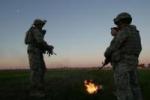is Eric Maddox's MISSION BLACKLIST # 1. It is the story of and by the interrogator who worked with the JSOTF to find Saddam Hussein. The final interrogation - and the only one of the source who knew where Saddam was - took only an hour and forty five minutes without the use of any "enhanced interrogation techniques."
I had the honor to moderate the panel at OU where Eric Maddox was the featured speaker - other members included a former Deputy DDO, David Edger, Dr. Chris Howard (Lt. Col. USAFR who served at the interrogation facility in Bagram), who is the next President of Hampton Sidney U. Maddox is a 1994 OU political science grad who is now a civilian interrogator for DOD. The book is excellent as was his presentation. He is a thoughtful young man who's service both as a soldier and a civilian is a credit to the Army, DOD, the great state of Oklahoma (he's a Sooner to the core), and the United states of America.
Cheers
JohnT











Bookmarks